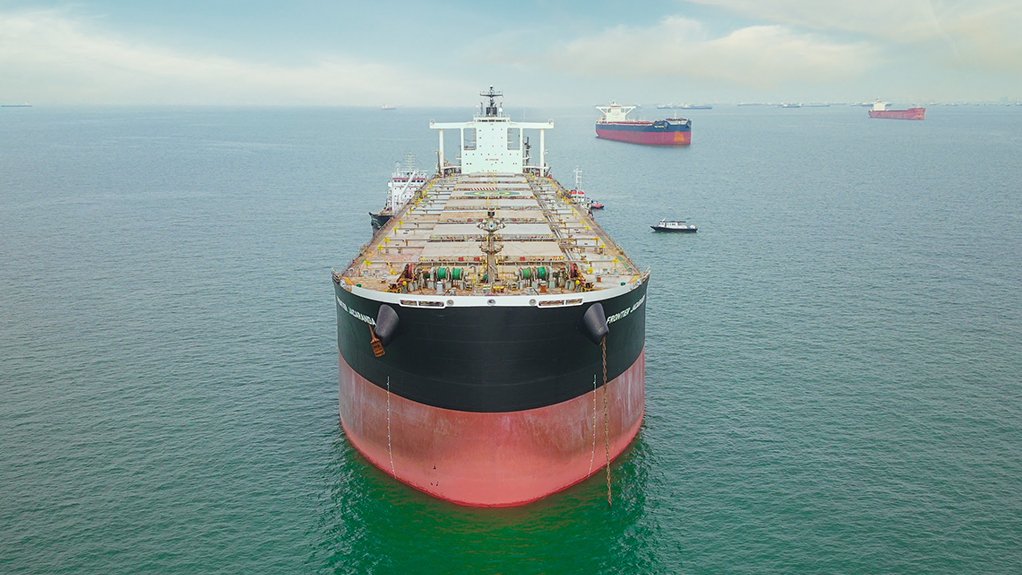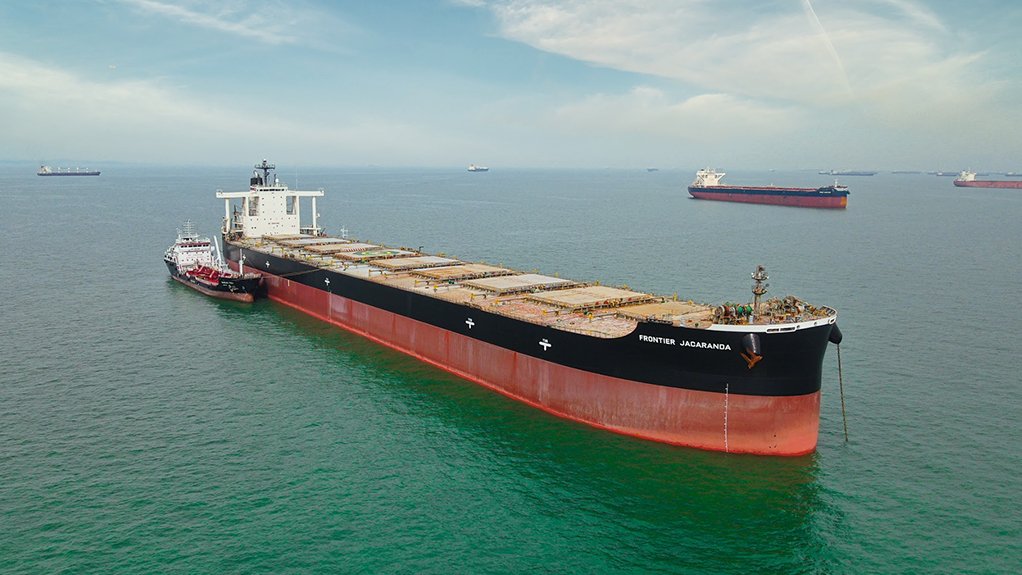JOHANNESBURG (miningweekly.com) – The use of sustainable biofuel to power a chartered capesize ship during a voyage from Singapore to South Africa has been successfully trialled as part of a decarbonisation initiative, Anglo American said on Tuesday.
The biodiesel blend was produced by converting waste cooking oil from Singapore’s food and beverage industry, which reduces carbon dioxide emissions when compared with using 100% conventional marine fuel.
The trial conducted onboard the Frontier Jacaranda, a capesize bulk carrier owned by Japanese shipping company NYK Line, was instrumental in verifying the stability of the biofuel in storage and its performance as a fuel.
Anglo partnered with Singapore firm Alpha Biofuels, which converts waste cooking oil into biofuel, to blend this sustainable biodiesel via shore tanks in Singapore.
The London- and Johannesburg-listed diversified mining company is exploring a number of ways through which to reduce carbon intensity in its ocean freight operations, including the use of ammonia as an alternative marine fuel, as well as adding capesize+ vessels into its chartered fleet fuelled by liquefied natural gas, which reduces carbon dioxide emissions by approximately 35%.
Mining company BHP last month announced that along with German shipping company Oldendorff Carriers, and advanced biofuels pioneer GoodFuels, it had successfully completed the first trial of sustainable biofuel on an ocean-going vessel bunkered in Singapore.
Anglo marketing business CEO Peter Whitcutt described low emission ocean freight as being crucial in driving the long-term sustainability of the maritime industry.
“Shaping an effective transition requires a comprehensive framework of complementary solutions, in which alternative marine fuels have an important role to play,” said Whitcutt in a release to Mining Weekly.
Anglo is partnering like-minded industry players to improve its understanding of factors likely to impact the future scalability of this solution.
“The success of this trial marks an important step forward in establishing biofuel as a viable option, aligned with circular economic principles,” Whitcutt added.
These efforts also reinforce Anglo’s commitment as an organisation to reduce emissions across the entire value chain, as it works towards carbon neutrality across our operations by 2040.
Data gathered is providing new insights into wider efforts to introduce biofuel to the maritime sector, paving the way to improving its cost-effectiveness and using higher percentage blends in future trials. The conversion of waste cooking oil into fuel for transportation aligns with the principles of the circular economy, by providing a fresh and environmentally beneficial use for what would otherwise be disposed of.
Toyota Tsusho Petroleum supplied the biodiesel blend, consisting of 7% biofuel and 93% regular fuel. This combination reduces carbon dioxide emissions by around 5%, is compliant with the International Organisation for Standardization’s requirement for marine fuels and requires no substantial engine modifications.
BHP'S BLENDED FUEL ‘DROP-IN’
As part of BHP’s trial, a 2020-built 81 290 t dry bulk carrier was refuelled with “drop-in” advanced biofuel blended with conventional fossil fuels.
The key objectives of the biofuel bunkering trial included understanding the behaviour of the fuel, assessing engine and vessel operational performance during the trial as well as exploring the technical and commercial merits and challenges of biofuels as a marine fuel.
BHP said that the trial would enable the company to develop an informed strategy on the structural supply and use of biofuels to support its key shipping routes.
These objectives are in line with BHP’s strategy to assess biofuels as a potential low-carbon fuel of the future, to help it meet one of its Scope 3 greenhouse gas emission goals for 2030.
BHP VP maritime Rashpal Bhatti stated in a release to Mining Weekly that the company was striving to influence emission reductions across the full life cycle of its products and fully supported moves to decarbonise the maritime industry.
Bhatti said that the advanced biofuel which reduced carbon emissions by 80% to 90% from well-to-exhaust used sustainable waste and residue streams as feedstock.
Oldendorff Carriers chose one of its modern Kamsarmaxes for the trial as appropriate modifications to the vessel were easily carried out to burn the biofuel blend efficiently, and monitoring instruments were installed to capture the trial data as accurately as possible.
EMAIL THIS ARTICLE SAVE THIS ARTICLE ARTICLE ENQUIRY
To subscribe email subscriptions@creamermedia.co.za or click here
To advertise email advertising@creamermedia.co.za or click here













